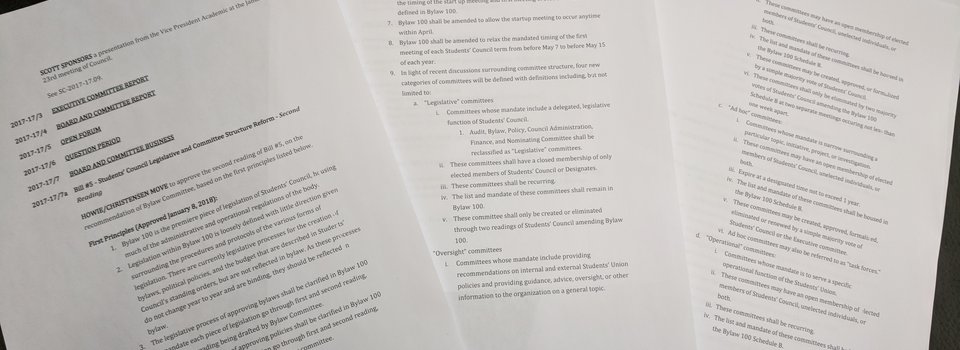On Monday January 11, Students’ Council passed, in first reading, a bill to change the way committees of Council operate. These changes will better define the role of committees, and expand the types of committees possible. Under the current system, only Councillors can sit on committees and the six committees preform a legislative function for Council. These Committees have limited scope, and are focused on performing few tasks. The main purpose of these committees is to speed up the meetings of council by allowing more in-depth analysis and robust debate. Because of this, the committees have different areas of jurisdiction; Audit Committee does not draft the wording of bylaws for Second Reading, just as Bylaw Committee does not review the financial documents of the organization.
The proposed changes will open up the types of committees available for Council to create. Unlike the current constraints on committees, new committees could have robust discussions on overarching topics. Currently, if the tall people on campus wanted changes with the SU, separate discussions would occur at committees as how they could implement changes to their area of influence. If Council consists of only short people, tall people would not be represented, as Council could not appoint a tall person to any committee. The new structure allows for Council to establish a ‘Tall Person Committee’ that advances the views of tall people on campus with representation from general tall students and from Councillors. These committees would have larger view than the current system. For example, a SUB committee could recommend the addition of more water fountains or be charged to advise on new food court tenants. Generally, these new committee types are designed so that Council can get the best people, elected or not, around a table to discuss a topic or issue.
All Committees, as currently, can and will be able to recommend changes or request advice from Council or any other Committee. Students’ Council will remain the single highest decision making authority of the Students’ Union.
| Current Committee Structure | Bill 5 Proposed Changes |
|
Students’ Council currently has “Standing Committees” to assist with the different operations or work that need action. Currently there are six standing committees. |
Students’ Council is proposing a different model that would potentially expand the number and range of committees under Council. |
|
Bylaw 100 defines ‘standing committee’ as:
|
Bill 5 proposes four different types of Committees:
|
|
There is no other definition as to what a standing committee is, or how it is different from other committees. There is also nothing in bylaw that denotes These Committees will exist from year to year automatically. The membership of these committees can only consist of current members of Students’ Council, including members of the Executive (except for the Audit Committee, that cannot have Execs as members). General undergrads do not have a vote or speaking rights at these meetings.
|
A legislative committee deals with delegated legislative functions of Council. They include the six current committees, and have the same restrictions on membership. These Committees will exist from year to year automatically. An Oversight Committee provides Council with recommendations on internal and external policies and provides guidance, advice, oversight, or other information on a general topic. This committee type allows for Council members, public members, or both. Also the committee will exist from year to year automatically. Ad Hoc Committees are limited in scope and focus on a particular issue or project and for a limited time not to exceed one year. Anyone could be a member of these committees. Operational Committees tackle a specific operational function and has some autonomy. An example would be the Health and Dental Committee. These Committees will exist from year to year automatically. |


